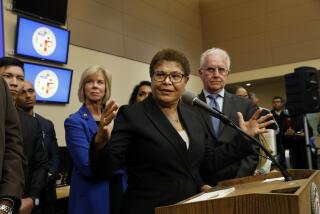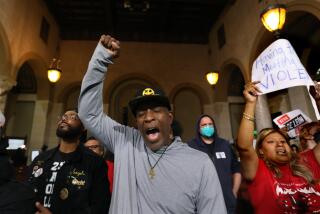Iraqi Council’s Most Pressing Task: Legitimacy
- Share via
BAGHDAD — They don’t know their term of office, their resources, their compensation or their clout.
About the only thing the 25 members of the Iraqi Governing Council seem sure of is that American occupiers are suddenly eager to hand them a share of responsibility -- some would say blame -- for running a country suspended in a dangerous vacuum.
Appointed by the U.S. six weeks ago and viewed by some Iraqis as merely putting a local face on the occupation, the council now is being looked to by U.S. officials as the best hope for getting the idle machinery of government and industry moving.
As the U.S.-led administration of Iraq scrambles to defend against terrorism and resistance, council members are being encouraged to speed up the process of building an Iraqi government and to show the flag abroad. The goal is to let doubters see them not as U.S. instruments but midwives of the next sovereign Iraq.
“The Americans would like to see fewer of their troops here,” council member Adnan Pachachi, a gray eminence and a foreign minister before Saddam Hussein’s rule, said of the U.S. push to escalate the hand-over. “Iraq is a hot potato. It’s not getting cooler, and [U.S. presidential] elections are in 14 months.”
Seizing on the opportunity to help the U.S. craft an exit strategy, the council has become more assertive, vowing to get its governmental act together swiftly so the unwelcome foreign rulers can leave.
“We call things by their name, despite the rhetoric. Iraq is under occupation,” the council’s current chief, Ibrahim Jafari of the Islamic Dawa Party, said Wednesday. “We want to do all we can to reduce the time period for ending the occupation, to show the Iraqi people we can end this quickly.”
Pachachi, 80, the oldest and arguably the most respected council member, said the U.S.-led authority has lately been “much more forthcoming” in helping the council acquire legitimacy in the eyes of the Iraqi public.
It was at the Americans’ suggestion that Pachachi and others traveled to the United Nations and Arab states during the last two weeks. Iraqi media have begun reporting on the council, sometimes casting the group as more than a facade for foreign occupation. The public, at best, has taken a wait-and-see attitude toward its evolving leadership, while many “see it as a toy in the hands of the coalition,” said journalist Nasir Timimi of the Arrehab daily.
Despite the shift in U.S. expectations, the council faces major challenges in morphing from symbol to substance. Six weeks have gone by with little to show because many members have gone on vacation or traveled abroad. The council must choose a Cabinet, confront daunting work in overseeing the drafting of a new constitution and then organize free elections.
How the Cabinet will function remains vague, as no individual has emerged as a natural leader. Jafari said there were no plans to designate a prime minister who would preside over the body.
Money is another contentious matter. The coalition still controls the purse strings, depriving the council of opportunities to make populist gestures that might convince more Iraqis it is truly in charge and that life will get better. Council members say there are plans to improve food rations and pay pensions and welfare once a Cabinet is seated and the government budget is in its hands.
The members themselves aren’t being paid yet. Salaries, to be set by the council but under self-imposed limits, await the resuscitation of the Finance Ministry, which in turn awaits the council’s appointment of a finance minister. As with all ministries awaiting new life in Iraq, the official in charge will then hire a dozen department heads, who will choose other staff members from among Hussein-era holdovers and fresh applicants.
Council members have been saying for weeks that they are on the verge of announcing their Cabinet appointments and had set today as their deadline. But discussions with several of them revealed nagging problems delaying the announcement, including resistance by chief U.S. civilian administrator L. Paul Bremer III to expanding the Cabinet -- to 25 posts from the 21 under the former government -- adding portfolios for environment, immigration and human rights, and splitting the ministry for transportation and telecommunications in two.
There also are clashes among the ethnically and politically diverse council, as some members accuse others of trying to grab power. Shiite Muslims, a majority in the country, enjoy a slight majority of 13 on the council. The remaining positions are held by Sunni Muslims, ethnic Kurds, a Turkmen, a Christian and four members of mixed ethnicity.
Space is another hindrance. The council’s headquarters, a one-story former reception hall for the Military Industrialization Organization that was run by a Hussein son-in-law, is lavishly adorned with marble floors and ornate sofas but has only three rooms available for daily conferences, receptions and thrice-weekly plenary sessions. Half a dozen small meetings often take place simultaneously in one room. A lunch buffet and a private dining room take up nearly half the building.
Worse still is the security provided by U.S. forces. Sandbags, concertina wire, tire-puncturing spikes and phalanxes of soldiers provide so many security cordons that council members are more than half a mile from any ordinary Iraqi.
Sondul Chapouk, one of three women on the council and the only ethnic Turkmen, said she holds most of her consultations with colleagues and advisors at the Baghdad hotel that is home while she is away from her native city of Kirkuk.
“I don’t have any bodyguards because I think God will protect us,” Chapouk said.
Two weeks ago, shortly after the Jordanian Embassy in Baghdad was bombed, U.S. officials decided to hire a 120-person security detail to protect the council. Threats by foreign extremist groups have been aired on Arab television stations, which have also reported that Hussein put a bounty of $25,000 on the heads of council members.
Since the even deadlier bombing of the U.N. headquarters here Aug. 19, U.S. advisors have informed the council it needs to gain credibility as the legitimate executive body for the country.
“After the explosion at the U.N., they realized they have to share power with the Iraqi people,” Habib Khuzaai, a council member and physician from Diwaniyah, said of the U.S.-led administration.
She acknowledges a credibility problem with the public -- she’s been called “an American agent” -- but believes that the council’s constituencies can be gradually won over if the members quickly get a government in place.
“Unless you have ministries, there’s no way to run the country. This should have been done a month ago,” Khuzaai said. She differs with some of her colleagues’ rosy predictions that a Cabinet will be named this week, pointing out that battles are yet to be fought over how to divide the portfolios.
The council’s cohesion is also taxed by tensions between members who remained in Iraq during the Hussein regime and those who went into exile and only recently returned.
“I don’t think they understand what we went through,” Khuzaai said of colleagues who fled the country. “If you live through so much stress yourself, it’s different than if someone just tells you about it.”
She declined to name names when conceding there are some “difficult personalities” on the council. Others intimate that Ahmad Chalabi, head of the Iraqi National Congress faction and the CIA-trained figure many officials in the Bush administration had hoped would emerge as Iraq’s postwar leader, has the weakest grip on a homeland he left 45 years ago.
Many council members are candid about their limitations.
“We’re still stalled. We haven’t accomplished enough. People are saying the Governing Council hasn’t done anything for them, that we are not serving the people,” said Nasir Chaderchi, a lawyer and leader of the National Democratic Party. He criticizes both the occupation authority and the council for a situation in which security and public services “get worse every day.”
Chaderchi joins Pachachi, Jafari and other prominent council members in arguing that Cabinet posts should be assigned to those with the best skills and experience, not according to the broad spectrum of religious, ethnic and political groups represented on the council.
“I am a Sunni by birth but not a Sunni by thought,” Chaderchi said. “I do not like to be selected and classified by ethnicity.”
Younadam Kanna, the council’s only Christian, takes the view that “these are the colors we have to deal with” and that diversity is a stabilizing asset. But he isn’t convinced there will be a lot of grappling among the parties, movements and ethnic groups for Cabinet posts that are going to be thankless jobs.
“Being a minister today does not mean power. Everything is so broken down, we have to reestablish every ministry from Saddam Hussein’s ruins,” said Kanna, the head of the Assyrian Democratic Movement.
Like his colleagues, Kanna sees the council’s fortunes riding on the imminent capture or killing of Hussein, as the former dictator’s unknown whereabouts and the continued resistance by elements of his government make many Iraqis wary of openly supporting the transition.
Council members are uniformly critical of the Americans’ reluctance to cede more authority in defense and security matters to Iraqis. Most blame U.S. decisions to disband the police and army for leaving the country vulnerable to looting, sabotage and terrorism. Some also think banning former Baath Party members from office has gutted the government and will continue to haunt the council as it struggles to repair the damage.
“It’s like trying to get a clock ticking again after taking out some of its parts,” said the council’s administrative secretary, Ahmad Mukhtar.
More to Read
Sign up for Essential California
The most important California stories and recommendations in your inbox every morning.
You may occasionally receive promotional content from the Los Angeles Times.











